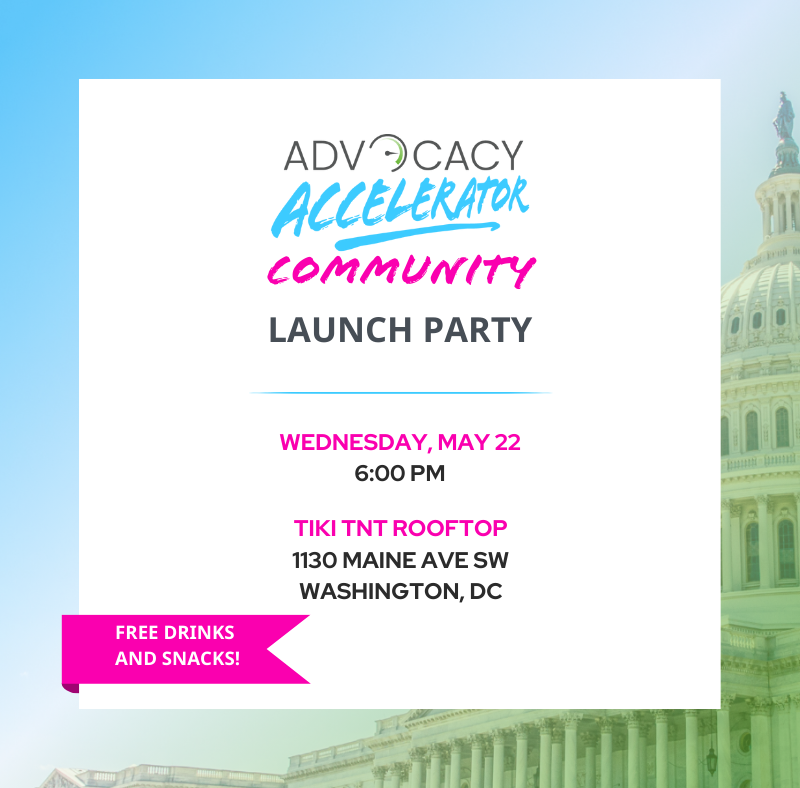Recently, CURA launched the Advocacy Accelerator. Anyone who has visited the resource and community hub will see that there is a lot there and it must have taken a lot of effort. It did. We invested over $100,000 in time and money to get this off the ground.
Why did we do it? Read on to learn about the four strategic insights that compelled us—a boutique agency—to go all-in.
INSIGHT 1
The DC market is 3-8 years behind on most business trends.
Maybe it’s because people are more focused on making news and solving societal issues than keeping up with business-related trends. Who knows. I know this because I’ve lived here for 30 years and experienced it.
When I started CURA eight years ago, I soaked up the on-demand free resources available through websites and podcasts. For example, after listening to Michael Hyatt’s podcast, I invested in group coaching and peer mastermind groups with other small business CEOs. I’m still an annual subscriber to his Full Focus Planner system. I continue to invest in one-on-one coaching with Kyle Coolbroth of Cothink’r, who I met through Michael Hyett’s program.
To help expand my base knowledge to more marketing disciplines, I found Donald Miller’s Business Made Simple Podcast and purchased his book StoryBrand for my whole team. I also listen to the Agency Leadership Podcast where I learned about and joined Gini Dietrick’s free Spin Sucks! Community. Finally, I am an avid listener of Online Marketing Made Easy by Amy Porterfield and have binged many episodes on creating a digital course before we launched Advocacy Academy.
All these experts in their field were using the same business model—building and networking a loyal community of followers by offering an abundance of free tools and knowledge on a regular basis, and then marketing a paid product to them. It’s basically a thought leadership-based selling model.
INSIGHT 2
This model does not exist when it comes to the practice of advocacy.
You can find tons of podcasts, newsletters and trade groups discussing current events and diving into policy issues, but there are no free resources or communities dedicated to the “how to” of advocacy—certainly not health care advocacy.
Among the many reasons why I don’t think the thought-leadership-based selling model has “hit” DC is that it is very resource-intensive to do it well. Additionally, you are giving away a lot of intellectual property. Finally, people with deep pockets want to hire you to do it for them, not necessarily learn how to do it themselves. But what about the people who are being paid to advocate? Where are they being encouraged to stay current on their trade? Where is their health care-specific community? What about the professional advocates who don’t have the deep pockets?
This leads me to the context for my third insight. CURA is a mission-centered agency. We exist to transform health care. It is unfortunate that something as important as health care policy advocacy is not easier or cheaper to learn how to do.
Advocacy is one of our areas of expertise. We have both a strategic communications practice and a public affairs practice that includes registered lobbyists. I honestly believe that when it comes to launching an integrated advocacy campaign to advance a health issue, we are the best in the business.
INSIGHT 3
No agency has spent as much time systematizing the tools and best practices to facilitate powerful patient advocacy, nor given away as much intellectually property, as we have at CURA Strategies.
Here are just a few of the resources we have shared:
- A system to map stakeholders—The Influencer Index©
- A scoring rubric for prioritizing issues
- The Health Policy Profiles of new members of Congress to gauge who are most likely to impact health policymaking
- A free course on how to plan and execute an integrated advocacy campaign called the Art of Advocacy
INSIGHT 4
If our mission is truly to transform health care AND we have the knowledge of how it can be done well and see a model That is working in other industries, THEN we must try to fill the gap.
My initial reaction to this insight was—Really? There must be good reasons why this does not already exist yet. It’s too hard. It’s too expensive. People are not interested. We don’t know how. We already have full-time jobs and we don’t have the time. That is what we told ourselves for a while.
Then we decided to create the Advocacy Academy for a client—an online course designed for government relations professionals to give to their volunteer advocates to help them understand the role of advocacy, how Congress works and how to effectively tell their story. Once again, we had an educational piece we thought could help a lot of people. As we searched for how we were going to administer the course, it became overwhelmingly clear—we had to launch it online as part of the idea of building a broader community to accelerate change.
After many whiteboard sessions, lots of trial and error, hours of video watching and podcast listening, endless calls with beta testers, all totaling well over $100,000 in staff time and out-of-pocket costs, the Advocacy Accelerator and its flagship product—the Advocacy Academy—is finally here!
The Academy course is on fire and being well received by students who take it. Our downloadable resources are hot. People are signing up for our Capitol Corner newsletter. It’s working!
The final piece—the community—is intentionally a work in progress. Our desire is to build a bipartisan community of people who can learn from one another, create and share resources (including CURA’s) and in general, help advance health care change by becoming better health care advocates. The format that takes is TBD. We are hosting our first community event as a launch party on May 22 in D.C. to gain perspectives and ideas.
How can you get involved?
- Create a profile to be an Accelerator member. It’s free and opens a wealth of resources
- RSVP if you would like to come to the May 22 launch party in D.C.

Many thanks to everyone at CURA who put their heart and soul into this project and to the client partners who served as beta testers for this effort—WomenHeart, PKD Foundation, IgAN Foundation, The Mended Hearts Inc., Healthy Happy Caregiver, Travere Therapeutics and Honor the Gift.
